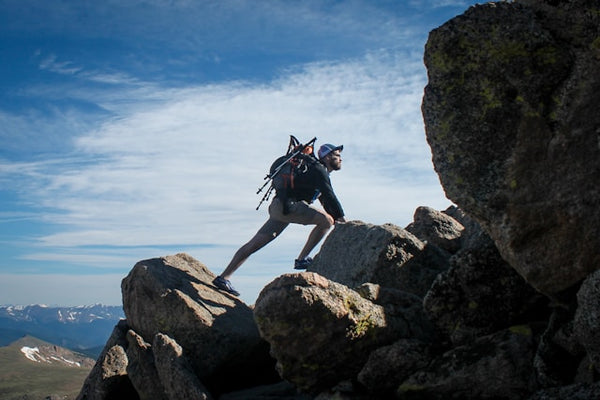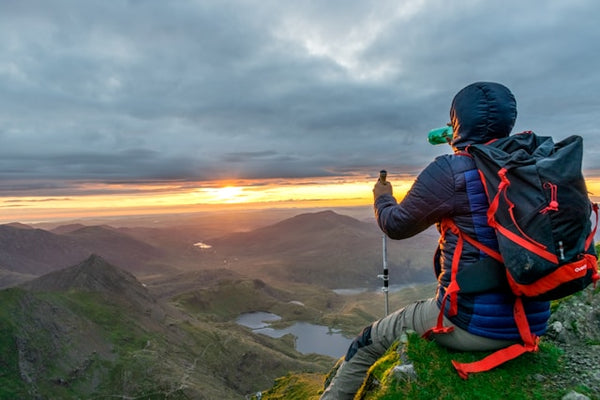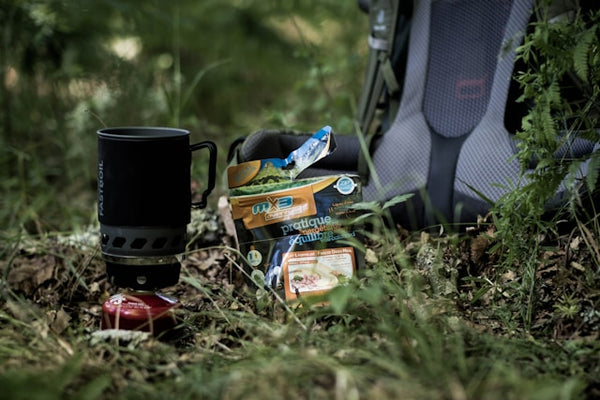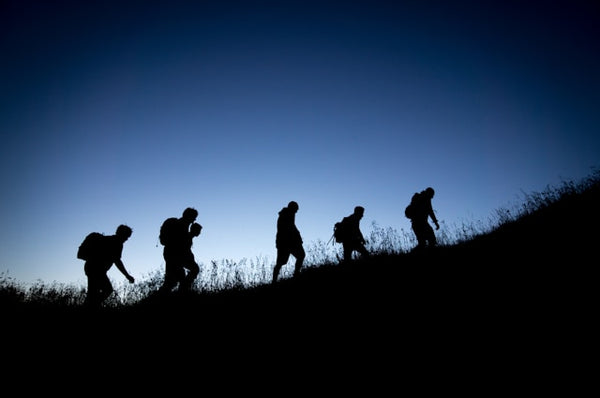With over 10,000 orders
With over 10,000 orders

Photo by Joshua Earle on Unsplash
Overnight hiking promises an immersive experience, offering a unique opportunity to delve deeper into the wilderness and witness nature's wonders under the canvas of the night sky. It's a chance to trade the hustle and bustle of daily life for the tranquility of the great outdoors, where the rhythm of your footsteps syncs with the heartbeat of the earth. Yet, venturing into the realm of overnight hiking demands meticulous planning and preparation to ensure both safety and enjoyment along the trail.
For those stepping into the realm of overnight hiking for the first time, the prospect may feel simultaneously exhilarating and daunting. Questions abound: Where to begin? What essentials are needed? How to navigate the complexities of trail selection and campsite setup? Fear not, as with careful guidance and attention to detail, embarking on your inaugural overnight hiking adventure can be a transformative journey filled with discovery and fulfillment.

Photo by Nina Luong on Unsplash
Begin your overnight hiking journey by delving into thorough research to select the perfect destination that aligns with your hiking expertise and preferences. Look for trails renowned for their beginner-friendly features, such as clearly marked paths, manageable terrain, and accessible camping sites. Take into account crucial factors like trail length, elevation changes, terrain ruggedness, and prevailing weather conditions to ensure a comfortable and enjoyable experience. National parks, state forests, and designated wilderness areas often offer a variety of trails suitable for novice hikers, providing opportunities to immerse oneself in nature without overwhelming technical challenges.
Once you've narrowed down your options, delve deeper into each potential trail's characteristics, seeking out recent trail reports, maps, and online forums for insights from fellow hikers. Pay attention to reviews and recommendations regarding trail difficulty, scenic highlights, camping amenities, and potential hazards. Additionally, familiarize yourself with any permit requirements or reservation systems in place for your chosen destination, ensuring you secure the necessary permissions well in advance. By conducting thorough research and selecting a suitable hiking trail, you lay a solid foundation for a memorable and rewarding overnight adventure amidst the wonders of the great outdoors.
Related: 8 Of The Best Night Hiking Trails In The USA

Photo by Unseen Studio on Unsplash
Before setting off on your overnight hike, it's crucial to familiarize yourself with any permit or reservation requirements for your chosen trail and camping area. Many popular hiking destinations, particularly those within national parks or wilderness areas, have regulations in place to manage visitor numbers and protect the environment. These regulations may include quotas on the number of overnight campers allowed per day or specific campsites that require advance booking. Failing to comply with permit or reservation requirements could result in fines or being turned away from the trailhead, so it's essential to plan ahead and secure any necessary permits well in advance of your trip.
Ensuring you have the correct permits or reservations not only guarantees your access to the trail and campsites but also contributes to the preservation of the natural environment. By adhering to permit regulations, you help prevent overcrowding, minimize human impact on fragile ecosystems, and support conservation efforts. Additionally, some permit systems incorporate safety measures, such as tracking the number of hikers on the trail at any given time, which can be invaluable in emergencies. Therefore, take the time to research permit and reservation requirements for your overnight hike, and make arrangements accordingly to ensure a smooth and enjoyable outdoor experience.
Related: How to land the most popular hiking permits in 2024?

Photo by Brad Barmore on Unsplash
Next, it's crucial to honestly assess your fitness level before hitting the trail for an overnight hike. Unlike day hikes, which may only require a few hours of exertion, overnight hikes demand sustained physical endurance over longer distances and varied terrain. Take the time to evaluate your stamina, strength, and overall fitness to ensure you're prepared for the challenges ahead. If you're new to hiking or haven't engaged in physical activity recently, consider starting with shorter day hikes to gradually build up your endurance before tackling an overnight adventure.
Additionally, incorporating targeted training into your routine can help you prepare for the rigors of overnight hiking. Focus on activities that improve cardiovascular fitness, such as walking, jogging, or cycling, to enhance your endurance. Strength training exercises, like lunges, squats, and core exercises, can also help build the muscle strength needed to carry a loaded backpack comfortably. By investing in your fitness beforehand, you'll increase your chances of enjoying a successful and rewarding overnight hiking experience.
Related: How to get in shape for hiking?

When it comes to packing for your first overnight hike, the mantra is "pack light, but don't forget the essentials." Every ounce counts when you're carrying your gear on your back for an extended period. Choose lightweight, compact gear that serves multiple purposes to minimize the weight of your pack. Essentials such as a tent or shelter, sleeping bag, and sleeping pad are non-negotiables for a comfortable night's sleep in the wilderness. Additionally, a reliable stove for cooking meals, sufficient food and water supplies, navigation tools like a map and compass, a first aid kit, extra clothing layers, and a headlamp or flashlight are indispensable items to include in your pack. Strike a balance between carrying enough supplies to be prepared and keeping your pack weight manageable for the hike ahead.
Furthermore, thoughtful meal planning is key to sustaining your energy levels throughout your overnight hike. Choose lightweight, non-perishable foods that are easy to prepare and require minimal cooking, as carrying heavy cooking equipment can add unnecessary weight to your pack. Consider packing nutrient-dense foods that provide sustained energy, such as trail mix, energy bars, dehydrated meals, and instant oatmeal. Don't forget to include plenty of snacks to keep you fueled during breaks along the trail. By packing efficiently and prioritizing essential items, you'll be well-equipped for a successful and enjoyable overnight hiking experience.
Related: 10 Survival Hiking Gear Every Hiker Should Carry

Photo by Les Argonautes on Unsplash
Now, let's delve into meal planning, a crucial aspect of preparing for your overnight hike. Opt for lightweight, non-perishable foods that are easy to prepare and require minimal cooking. Consider packing items like dehydrated meals, instant noodles, trail mix, energy bars, and dried fruits. These options provide a good balance of carbohydrates, protein, and fats to fuel your body throughout the hike. Additionally, don't forget to pack plenty of snacks such as nuts, granola bars, and jerky to keep your energy levels up while on the trail. Organize your meals in advance, dividing them into individual portions and labeling them accordingly to streamline mealtime at the campsite.
When planning your meals, also consider dietary restrictions, allergies, and personal preferences. Choose foods that you enjoy eating and that agree with your digestive system. Keep in mind that your appetite may fluctuate during the hike, so pack a variety of foods to cater to different cravings and energy needs. It's also wise to include some comfort foods or treats to boost morale after a long day of hiking. By carefully planning your meals and snacks, you'll ensure that you have the energy and nutrition you need to tackle the trail and enjoy your overnight hiking experience to the fullest.

Photo by David Becker on Unsplash
No matter where your hiking adventure takes you, keeping an eye on the weather forecast is always very important. Weather conditions in mountainous or remote areas can shift unexpectedly, potentially turning a sunny day into a rainy ordeal or bringing about a sudden drop in temperature. By staying informed about the forecast for your hiking destination, you can better prepare for any weather-related challenges that may arise along the trail. Packing appropriate clothing layers, rain gear, and extra insulation can make all the difference in ensuring your comfort and safety, even in the face of inclement weather. Additionally, having a backup plan or alternative routes in mind can provide valuable flexibility in case the weather takes a turn for the worse.
Remember, being prepared for various weather scenarios doesn't just enhance your comfort—it's also a matter of safety. Extreme weather conditions, such as thunderstorms, high winds, or sudden drops in temperature, can pose serious risks to hikers, especially in exposed or rugged terrain. By checking the weather forecast before your hike and monitoring any updates throughout your journey, you can make informed decisions about when to proceed or when to seek shelter. Stay vigilant, stay dry, and stay safe on your outdoor adventures.

Photo by Tobias Mrzyk on Unsplash
Before setting off on your overnight hike, it's crucial to share your itinerary with a trusted friend or family member. Providing them with details such as your planned route, designated campsites, estimated hiking times, and expected return date ensures that someone is aware of your whereabouts in case of emergencies. This simple precaution can significantly aid rescue efforts and expedite assistance if you encounter unforeseen challenges or get lost along the trail.
In addition to sharing your itinerary, consider discussing contingency plans with your emergency contact. Establish a protocol for what steps to take if you fail to check in at predetermined intervals or if they don't hear from you by a certain time. Clear communication and proactive planning enhance safety measures and provide peace of mind for both you and your loved ones while you're out enjoying the wilderness.

Photo by Florida-Guidebook.com on Unsplash
This journey into the wilderness is not just about personal exploration; it's a commitment to preserving the pristine beauty of nature for generations to come. With every step, it's essential to embody the principles of Leave No Trace, ensuring that our presence in these untamed landscapes leaves minimal impact. Adhering to these principles means more than simply carrying out our trash; it requires a holistic approach to outdoor ethics, respecting the delicate balance of ecosystems and wildlife habitats.
As we traverse the trails, let's tread lightly, refraining from disturbing the natural environment or leaving behind any traces of our passage. Whether it's properly disposing of waste, minimizing campfire impacts, or respecting wildlife by observing from a distance, every action we take contributes to the preservation of these precious wilderness areas. By practicing Leave No Trace, we not only show reverence for the outdoors but also set a positive example for others to follow, ensuring that future generations can continue to experience the awe-inspiring beauty of nature firsthand.

Photo by Mineragua Sparkling Water on Unsplash
Many hikers underestimate the importance of staying properly hydrated during their adventures, particularly on overnight hikes where exertion levels are higher and water sources might be less accessible. Dehydration can lead to decreased performance, fatigue, and even more severe health issues. To counteract this, it's essential to drink water regularly throughout the hike, even if you don't feel thirsty. Consider using a hydration bladder or water bottles with easy access to ensure you can sip on water without interrupting your pace. Additionally, be mindful of electrolyte balance by incorporating electrolyte-rich snacks or drinks into your hiking nutrition plan, especially if you're sweating heavily.
When pacing yourself on an overnight hike, it's crucial to find a rhythm that allows you to maintain a steady pace without overexerting yourself. Remember that hiking with a heavy backpack requires more energy than day hiking, so listen to your body and take breaks as needed. Embrace a pace that allows you to enjoy the journey and take in the sights without feeling rushed. By staying hydrated and pacing yourself effectively, you'll maximize your enjoyment of the hike and ensure you have the energy to reach your destination safely.

Photo by KAL VISUALS on Unsplash
Last but not least, remember that hiking is not just about reaching your destination; it's about enjoying the journey itself. Take the time to immerse yourself in the sights, sounds, and scents of the wilderness around you. Pause to appreciate the beauty of a sunrise over the mountains or the tranquility of a forest stream. Embrace the sense of freedom and adventure that comes with exploring the great outdoors.
As you trek along the trail, allow yourself to disconnect from the distractions of everyday life and fully immerse yourself in the present moment. Let go of worries and stresses, and allow nature to rejuvenate your mind, body, and spirit. Whether you're navigating rocky terrain or resting at a scenic overlook, remember to savor every step of the journey and cherish the memories you create along the way.
Planning your first overnight hike may seem daunting, but with proper preparation and a positive mindset, it can be an unforgettable adventure. Follow these tips, stay safe, and embrace the opportunity to connect with nature and challenge yourself in new ways. Happy trails!
Hungry for more?
{"one"=>"Select 2 or 3 items to compare", "other"=>"{{ count }} of 3 items selected"}
Leave a comment